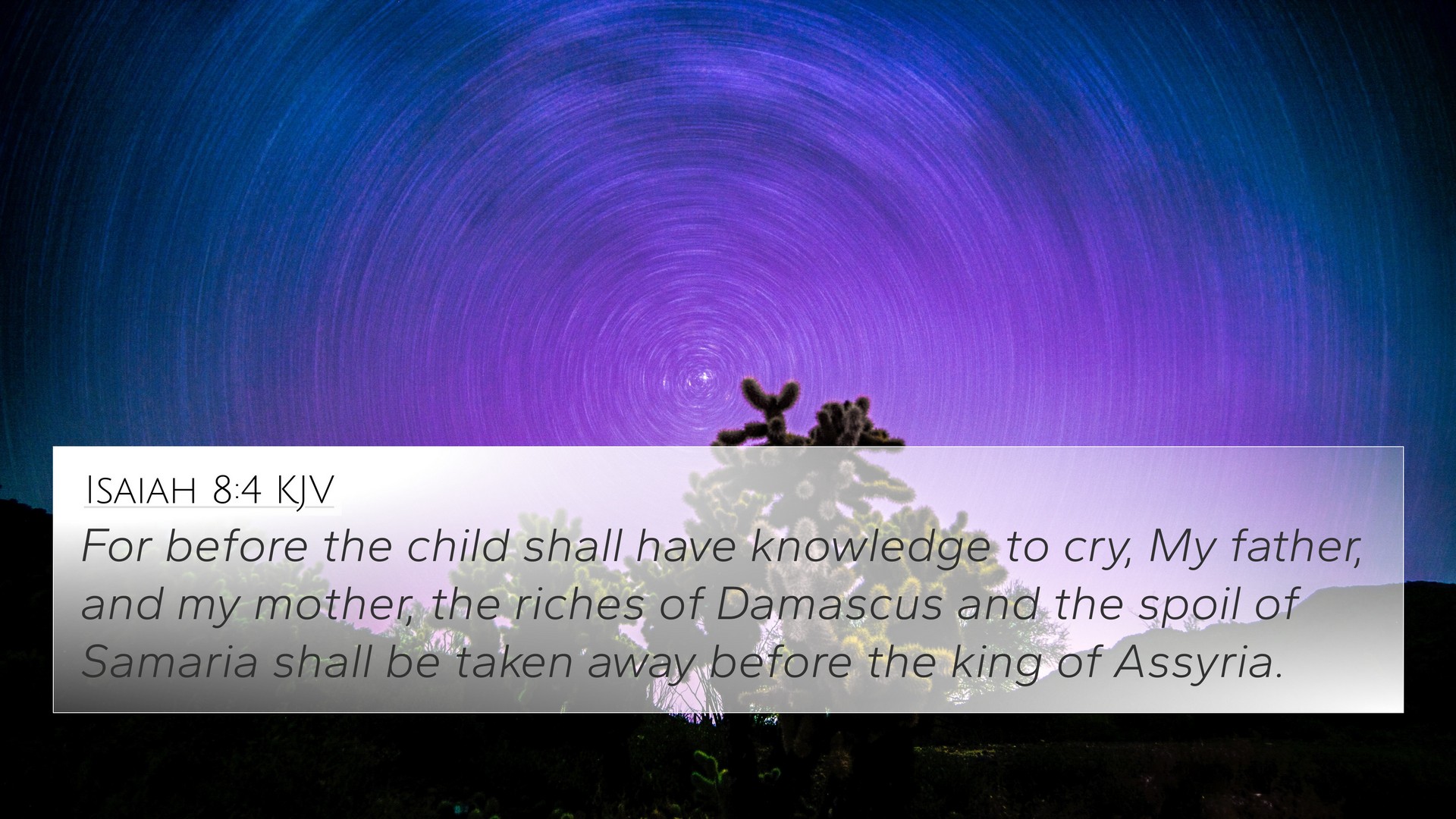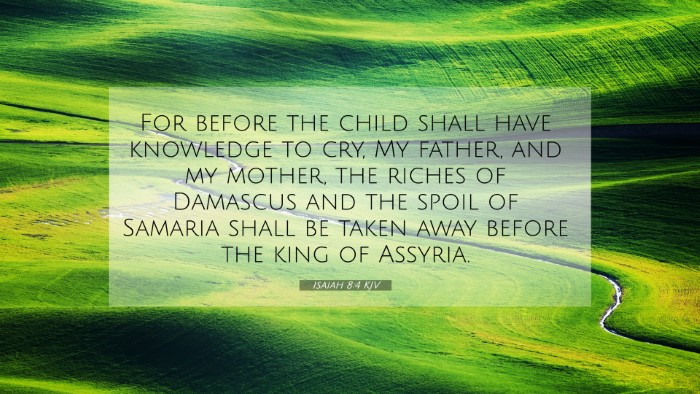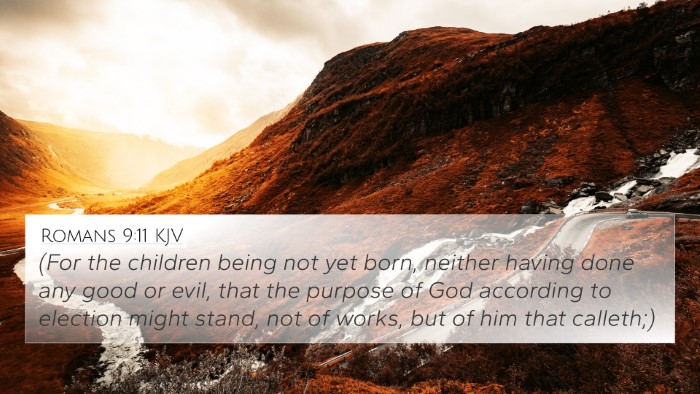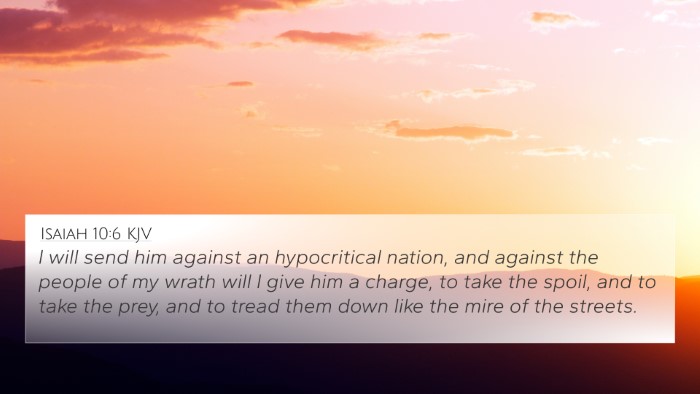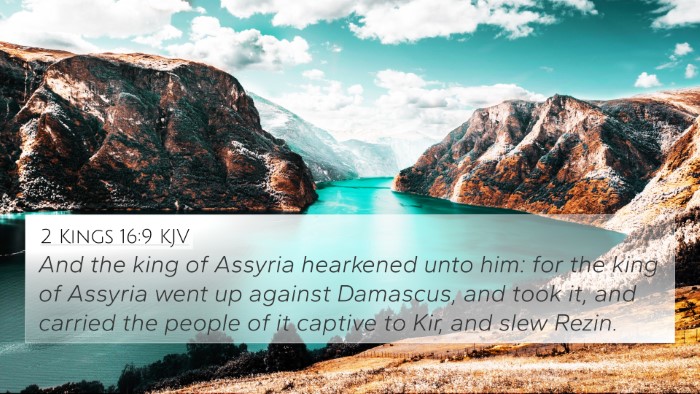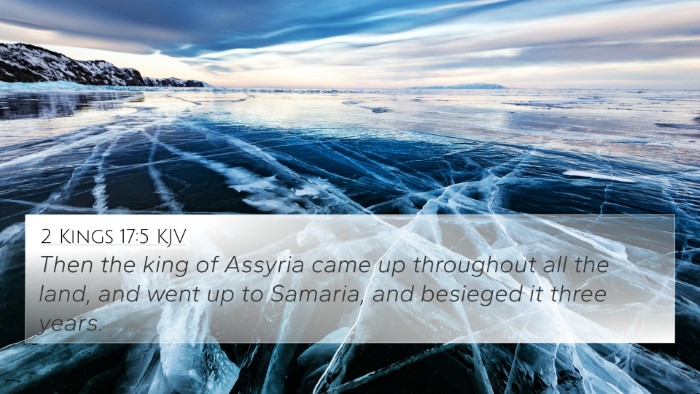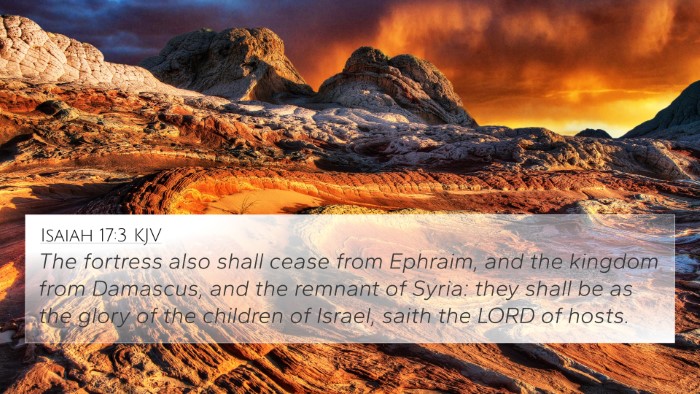Understanding Isaiah 8:4
Verse Text: "For before the child shall know to cry, My father, and My mother, the riches of Damascus and the spoil of Samaria shall be taken away before the king of Assyria." (Isaiah 8:4, KJV)
This verse is part of a prophecy given by Isaiah concerning the impending invasion of Judah by the Assyrian Empire. Instilling fear and awe at the power of God, it speaks to the rapidity with which events will unfold.
Meaning and Interpretation
The verse can be understood through the interpretations of noted Bible scholars. Here are some key insights combined from public domain commentaries:
- Matthew Henry: This commentary emphasizes the swift nature of divine judgment. The 'child' mentioned represents both the immediacy of God's plans and symbolizes the assessed age of innocence before the realities of their surroundings necessitate knowledge of such anguish. Before the child can mature and grasp familial relationships—symbolizing a period of safety and normalcy—tragedy, in the form of war and loss, will descend upon Israel and Judah.
- Albert Barnes: Barnes elaborates that the prophecy indicates a time frame in which God would execute judgment upon the nations and fill the land with desolation, signifying the certainty and inescapability of divine will. The mention of Damascus and Samaria highlights the geopolitical landscape and foreshadows their downfall, which reassures the Israelites of God's sovereignty over their enemies.
- Adam Clarke: Clarke’s view focuses on the metaphor of the child. The reference implies that just as a child rapidly reaches an age of understanding, the calamities facing Israel will occur quickly, demonstrating God’s control over the timing of events in salvation history. The ‘riches of Damascus’ represent the wealth that shall be rendered useless in time of calamity, signifying a broader theme of how earthly possessions can be transitory in the face of divine action.
Thematic Connections
This verse can be cross-referenced with various scriptural texts that highlight similar themes, such as:
- Isaiah 7:16: "For before the child shall know to refuse the evil, and choose the good, the land that thou abhorrest shall be forsaken of both her kings." This emphasizes the swift rejection of evil and brings in the theme of judgment.
- Isaiah 9:8-10: This passage elaborates on the destruction awaiting Israel, providing cohesion to the pending calamities mentioned.
- 2 Kings 17:6: This recounts the fall of Samaria and reflects on the judgment that matches the context of Isaiah's prophecy.
- Jeremiah 1:12: References God's promise of vigilance over His word, affirming the certainty behind prophetic declarations.
- Luke 2:40: The mention of a child's growth can also be seen in the New Testament, linking back to the idea of maturation and divine intervention.
- Micah 5:5: This connects to the theme of deliverance amidst impending invasions in the prophetic literature.
- Matthew 2:13-15: Here, divine guidance regarding a child's safety illustrates the motif of protection amidst turmoil.
Cross-Referencing Insights
The practice of Bible cross-referencing is essential for deeper insights. By exploring connections between passages, we are provided with layers of understanding. Here are some tools and methods to enhance your study:
- Bible Concordance: Use a concordance to locate specific themes and phrases across the Bible.
- Bible Cross-Reference Guide: These are invaluable for identifying related verses that share themes, figures, or events.
- Cross-Reference Bible Study: Engage in study methods that allow you to draw parallels between verses effectively.
- Bible Reference Resources: Consider using compiled resources that categorize thematic connections within Scripture.
- Bible Chain References: Explore chains of references that connect various Scripture verses, facilitating easier elucidation of Biblical themes.
Conclusion
Isaiah 8:4 serves as an example of the prophetic pronouncements found throughout the Bible that illustrate God's sovereignty over nations and highlight the themes of judgment and protection. By utilizing inter-Biblical connections and cross-referencing methods, a deeper understanding of such verses can be achieved, enriching one’s journey through the Scriptures and enhancing their ability to draw theological conclusions applicable to life’s challenges.
